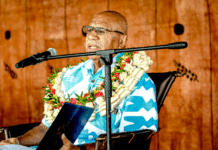
By a special Asia Pacific Report correspondent in Jakarta
It was September 2019, and exiled Indonesian human rights lawyer Veronica Koman was enjoying her final days in Australia. Her studies at the Australian National University in Canberra were almost over and all that was left was to wait for graduation day.
One afternoon, Koman’s mobile phone rang. There was an SMS message from a friend in Indonesia.
Her colleague informed her that the police had declared Koman a suspect.
Since August 17, 2019, the Papua issue had been heating up. Racist actions by rogue security personnel against Papuan students in the East Java provincial capital of Surabaya had triggered a wave of public anger.
Protest actions were held in several parts of the country, including in Papua. The government even cut internet access in Papua after several of the demonstrations ended in chaos.
In the mist of this critical situation, Koman was actively posting on Twitter, sharing information about the mass movement in Papua.
On September 4, Koman was officially declared a suspect. Police charged her under multiple articles, including the Information and Electronic Transaction (ITE) Law.
ITE law ‘is so rubbery’
Aside from the ITE Law, Koman was also indicted under Law Number 1/1946 on Criminal Regulations, Article 160 of the Criminal Code (KUHP) and Law Number 40/2008 on the Elimination of Racial and Ethnic Discrimination.
“I had thought about what articles would perhaps be used to criminalise me. I strongly suspected it would be the ITE. It turned out to be true, because the ITE is so rubbery,” explained Koman when contacted by CNN Indonesia.
Koman said that it was easy to use the ITE Law to criminalise people. Aside from the “rubber” (catchall) articles, the law does not require much evidence. A screen capture from the internet is enough, and the case can go ahead.
She believes there has been a tendency to use the ITE Law to silence activists over the last few years and she gave several examples of cases in Papua.
Koman said that several Papuan activists were indicted under the ITE Law in 2020. They were accused of committing hate speech, yet the activists only criticised police policy.
“Hate speak must contain SARA [hatred based on ethnic, religion, race or inter-group]. Not for hating the police, that has now become hate speech. The tendency in Papua is like that, the ITE Law’s interpretation of hate speech is like that.
“Yeah, I was confused, upset,” she said laughing.
After being declared a suspect, Koman was also put on the wanted persons list (DPO). Because she had been declared fugitive, she was unable to return to Indonesia after her graduation.
“The problem was, if I got imprisoned, who would report alternative information (about Papua)? If they want to arrest me, then arrest me, but I’m not going to turn myself in,” she said.
Agreement with Widodo
Koman supports President Joko “Jokowi” Widodo’s recent proposal to revise the catchall articles in the ITE law, saying that the law violates freedom of expression.
She related how she was often teased by her followers on Twitter. They say she wasn’t afraid to criticise the government because she had unwillingly ended up on the DPO. Meanwhile, they are afraid to criticise because of the ITE Law.
For Vero – as Koman is known – there is a serious issue behind the jokes by her followers. She says freedom to express an opinion in Indonesia is violated by the ITE law.
“[Indonesian] citizens don’t have to be imprisoned by the ITE law for their rights to be violated, no. When citizens feel afraid to express themselves, express an opinion, then their rights have already been violated,” said Koman.
Nevertheless, Koman warned that the struggle to uphold democracy will not end with the planned revisions to the ITE Law. She hopes that the public will take part in monitoring steps to improve the quality of democracy in Indonesia.
“Don’t be satisfied because President Jokowi hopes that the move to revise the ITE law will restore democracy. That’s just one step, there’s still a lot of homework to be done to restore democracy”, she said.
Nasib Jerat UU ITE: Jadi DPO dan Tak Bisa Pulang Kampung https://t.co/uMLOLx4zwB
— CNN Indonesia (@CNNIndonesia) February 19, 2021
Waiting for Widodo’s ‘seriousness’
Many are now waiting for Widodo to demonstrate his seriousness in abolishing the catchall articles in the ITE law. So far he has asked Indonesian police chief General Listyo Sigit Prabowo to draft guidelines on interpreting the law.
“All that it needs is political will. Does he want to do it or not, or is it just lip service?” asked Indonesian Legal Aid Foundation (YLBHI) chairperson Asfinawati when contacted by CNN Indonesia.
According to data released by the Southeast Asia Freedom of Expression Network (SAFEnet), the catcall articles in the law which need to be abolished include Article 26 Paragraph (3), Article 27 Paragraph (1), Article 27 Paragraph (3), Article 28 Paragraph (2), Article 29, Article 36, Article 40 Paragraph (2) a, Article 40 Paragraph (2) b, and Article 45 Paragraph (3).
Translated by James Balowski for IndoLeft News. The original title of the article was “Nasib Jerat UU ITE: Jadi DPO dan Tak Bisa Pulang Kampung”.















































